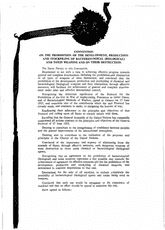Biological Weapons Convention (BWC)
The Biological Weapons Convention (BWC), formally known as "The Convention on the Prohibition of the Development, Production and Stockpiling of Bacteriological (Biological) and Toxin Weapons and on their Destruction” was designed to supplement the Geneva Protocol of 1925 which banned the usage, but not possession, of biological and chemical weapons. The BWC explicitly states that parties may not, “develop, produce, stockpile or otherwise acquire or retain” any biological agents that have no peaceful purposes, or technologies that could be used to disseminate biological weapons. Parties are also required to destroy any existing biological weapons technologies.
| Opened for signature | 10 Apr 1972 | ||||||||||||
| Entered into force | 26 Mar 1975 | ||||||||||||
| Latest update | 10 Apr 1972 | ||||||||||||
| Available languages |
|
States parties
The BWC has 185 states parties (as of March 2023). Parties were given the option to submit to any of the following three depositories: United States, United Kingdom or the Soviet Union (now the Russian Federation). If states deposited their instruments of ratification/accession to more than one depositary, the earliest date was used. For more detail, view the treaty’s status from the United Nation's Office for Disarmament Affairs.
Download the data in this table to view any reservations, understandings, and declarations (RUDs). RUDs submitted exclusively to the Russian Federation are not publicly available at this time.
Country | Status | Signed | Ratified | Entered into force |
|---|---|---|---|---|
| Afghanistan | Party | 10 Apr 1972 | 26 Mar 1975 | 26 Mar 1975 |
| Albania | Party | 3 Jun 1992 | 3 Jun 1992 | |
| Algeria | Party | 28 Sep 2001 | 28 Sep 2001 | |
| Andorra | Party | 2 Mar 2015 | 2 Mar 2015 | |
| Angola | Party | 26 Jul 2016 | 26 Jul 2016 | |
| Antigua and Barbuda | Party | 29 Jan 2003 | 29 Jan 2003 | |
| Argentina | Party | 1 Aug 1972 | 27 Nov 1979 | 27 Nov 1979 |
| Armenia | Party | 7 Jun 1994 | 7 Jun 1994 | |
| Australia | Party | 10 Apr 1972 | 5 Oct 1977 | 5 Oct 1977 |
| Austria | Party | 10 Apr 1972 | 10 Aug 1973 | 26 Mar 1975 |
Party
The state has accepted, approved, ratified, or is otherwise party to the agreement, indicating consent to be bound to the agreement.
Signatory
The state has signed, but not yet ratified or become an official party to the agreement. Where the signature is subject to ratification, acceptance or approval, the signature does not establish the consent to be bound. However, it is a means of authentication and expresses the willingness of the signatory state to continue the treaty-making process. The signature qualifies the signatory state to proceed to ratification, acceptance or approval. It also creates an obligation to refrain, in good faith, from acts that would defeat the object and the purpose of the agreement.
Non-party
The state has not taken any actions with regard to the agreement.
Associate member
The state may have requirements for some of the statutory or non statutory aspects of an agreement, but would not confer all of the obligations of the agreement on the member. Associate members may not have voting rights.
Observer
The state is non-party to an agreement, but has the ability to attend meetings or other discussions, and otherwise participate in activities. Observers may be granted permission to speak at formal meetings.




